This entry was supposed to be about the psychological aspects of not being able
to run any more but I'm just not ready to write that one yet.
Most of my best thoughts (and wry one-liners!) about this topic are
forever lost on the trails over the last two years, not written down as they
surfaced and long gone from conscious memory by the time I returned to pen and
paper --
or a keyboard -- at the end of those runs and hikes.
I haven't been able to recover enough of those thoughts this week to put
them into the kind of essay I want to write; they obviously aren't ready to
be shared yet with the world. As they continue to percolate I'll write about
a related topic that's been on my mind for a couple of months while I've been
dealing with my disappointment about not being able to run any more and revising my athletic goals.
ROOTS IN NATURE
I am one of those people who crave to be outdoors part of every day, even
when the weather is crappy.
I'm not clinically claustrophobic but I do get
"cabin fever" fairly easily. I think that's typical of runners, especially
trail ultra runners. We simply need to be outdoors as much as possible. Because I spend a lot of time in front of a computer or
doing other close work when
I'm indoors (reading, scrapbooking, quilting, other crafts), it does my eyes and brain good to
refocus at a distance outside, deeply breathe in some fresh air, exercise my
body until I'm sweating, and get a new perspective on
things -- literally.
I grew up on an 80-acre farm in southern Ohio. About half of it was too
hilly to be of much productive use for growing crops or raising animals but it
was nirvana for a tomboy like me. Some of my fondest memories of childhood are
walking and running around that place! We had wooded hills, a spring, and a
large creek, which in later years after we'd been long gone was dammed into a
Corps of Engineers lake:
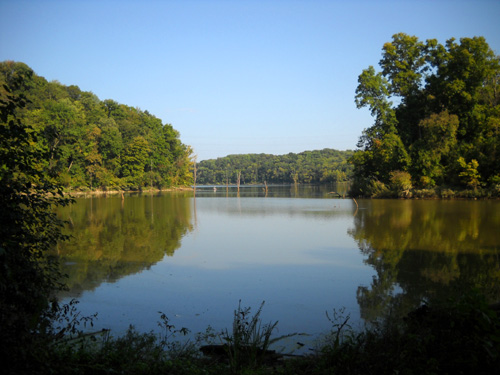
Water now covers what used to be our fields and a large
creek.
Trees, hills, water, wildlife, sunshine . . . all the necessities! They beckoned to my soul from the
very beginning of my life and they continue to beckon me out the door today.
There is a calm when I'm on a trail in familiar woods or meadows --
anywhere in this great land of ours, not just my local running venues.
Mountains, prairie, seashore, desert . . . it doesn't
matter if I'm walking leisurely on a recovery day or running so hard that
I can't talk: regardless of the effort to my
heart and lungs, when I'm out in nature my mind calms down, thoughts flow
freely, and there is nothing I'd rather be doing than enjoying that experience
at that very moment.
New trails and roads elicit a similar response. Even though there is more
anticipation and excitement and maybe even some fear when I'm exploring a new
place, it's not usually a stressful kind of excitement -- except for a few days
on the AT Adventure Run, like getting through Mahoosuc Notch in Maine:
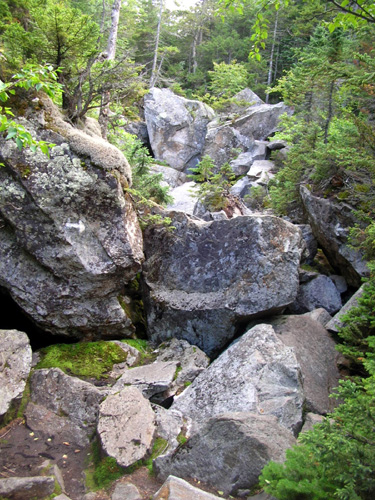
Over, under, or around -- your choice how
to negotiate the car-sized boulders in Mahoosuc Notch,
the toughest
mile on the entire Appalachian Trail (Day 127 of our 2005 AT Adventure Run)
I'd
describe exploring new places as the joy of discovery, which also calms my body and
spirit. Obviously I'm not the very first person to find the place --
just about every square inch of the continental USA has already been explored,
except maybe part of the Barkley course in Tennessee (ultra running joke!) --
but to me there's just nothing quite like seeing and feeling a place
for the first time, especially on foot.
It brings a smile to my face and peace to my very core. Any concerns about
yesterday or tomorrow vanish as I fully experience the present.
NATURE HEALS THE STRESS
This is one of the main things I want to preserve in my life even as I lose
my physical ability to run or walk as far as I'd like: I want to be able to experience the therapeutic
benefits of being out in nature until the day I die.
Nature heals us as it calms us. It prepares us to better cope with the other
aspects of 21st Century life. It keeps us sane in an insane world.
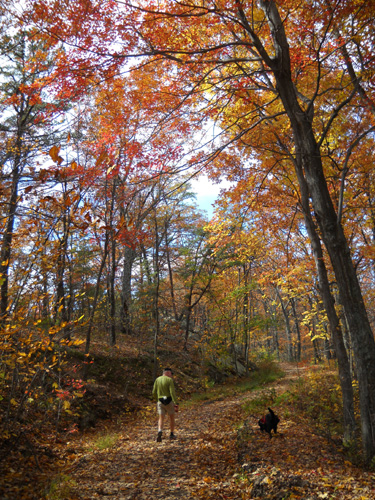
Two mellow fellows -- Jim and Cody -- enjoy a fine fall day
in the woods. (10-09)
I need to feel the sun on my face, the breeze in my hair. I need to hear the
splash of water in creeks, the chorus of frogs in a pond, the song of birds in
the treetops, the crack of branches as deer dart through the
trees. I need to smell what the forest smells like after it rains. I need to
see the new growth of spring, the lush greenery of summer, the colorful foliage
of autumn, the fresh snow of winter.
The first time I wrote that paragraph, I said "want" instead of "need." I
changed it later when I realized I don't just want those things, I
need them!
And I don't find them anywhere but outdoors, completely removed from the noise
and bustle of civilization. The good news is that you really don't have to
literally go that far into the
woods to find that kind of peace and quiet, either.
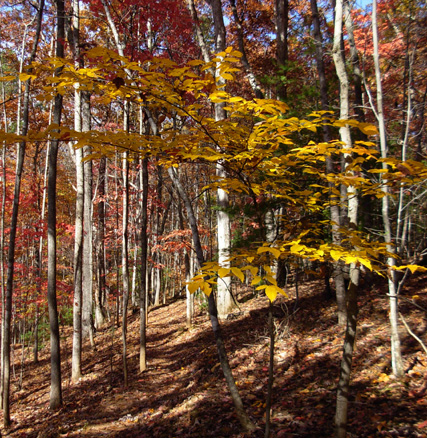
Explore Park is just off the busy Blue
Ridge Pkwy. and near urban Roanoke, VA
but it's a different world only a few
yards into the forest.
This fall I'm in the process of learning to appreciate shorter hikes in the
forests and mountains near Roanoke. Even an hour of brisk walking in the woods on a sunny day puts me in a
mellow mood and gets those feel-good endorphins flowing! My knee pain
disappears along with any urge to push hard -- if I do, I might
miss the graceful flight of a bright red leaf to the ground, or a delicate
mushroom poking its head through the moss. Throwing sticks for
Cody-the-ultra-retriever to chase as we hike through the woods has taken on a
more playful vibe that we both enjoy.
I've decided I can live happily without running as long as I can still walk!
The journey is becoming more important than how fast I reach the destination.
I will continue to get outside by foot or on a bike as much as I can as we
travel across the country this winter. I think I'll be able to maintain my
sanity and fitness as long as I can still get out on trails almost every day
-- and occasionally up on ridges with panoramic vistas -- whether it
is on foot or a bicycle. I know that some day I may be able to enjoy those
places only in/on a motorized vehicle (or a horse -- hey, I could be an
endurance rider!).
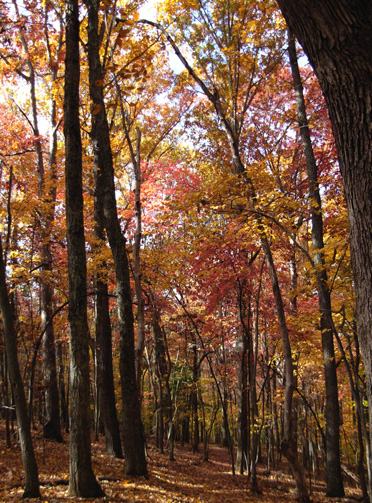
Explore Park in November: great secluded trails to run or
ride
When I can no longer ambulate comfortably, I'll adjust my goals again. Maybe I can learn to be just
as happy sitting outside my camper in the middle of the woods as I am when I'm moving
under my own power father into those woods or up a nearby mountain.
That's not a bad lifestyle -- it sure beats being cooped up indoors.
I just hope it doesn't come down to only that for a lot more years!
My mind and body don't do "sedentary" well.
THE NATIONAL PARKS: AMERICA'S BEST IDEA
For six nights in late September and early October I was glued to our TV
screen watching Ken Burns' fabulous 12-hour
documentary
about the national parks on PBS. Did
you see it?
I
don't watch much TV but this series totally engrossed me. I literally had goose
bumps of pride that our country (with great effort by many individuals) has
been able to cobble together so many millions of acres of pristine land for
everyone to enjoy -- even if they aren't American!
(It's ironic that some "foreigners" have seen more of this public land than
many of our own citizens.)
If you missed the film, I urge you to catch it on re-runs. The presentation
was gorgeous, educational, and fast-paced. It makes you want to go to every
beautiful place they featured -- right now. You can also purchase a (rather
pricey) DVD, CD of the soundtrack, book, and other items from the series at the
PBS website above.
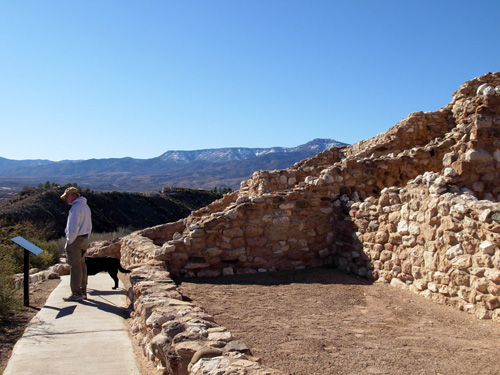
Cody got to check out Tuzigoot National
Monument in Arizona with us in January.
I spent a fair amount of time one day at Sam's Club leafing through the
large, thick companion book with much of the narrative written by Dayton Duncan
and many old and newer photographs of a good portion of our 391 national parks,
recreation areas, preserves, historic sites (battlefields, monuments), scenic
trails, parkways, rivers, lakes, and seashores.
I don't know if the DVD and CD are available anywhere besides the PBS
website.
I had no idea how difficult it was to preserve these wilderness areas and
historical sites in the
first place. What an eye-opener!
The concept that wilderness is a necessity was
(is?) foreign to many people yet seems so obvious to me. More people need
to get out of their concrete jungles and explore the outdoors! They have
no clue what they're missing.
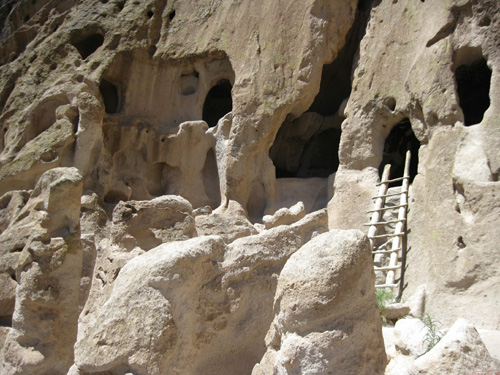
Bandelier National Monument in New Mexico (5-09)
I wrote down a lot of noble phrases and concepts that grabbed me, like
- going to the mountains is going home (oh, my, how expressive that
is!)
- our own human species needs outdoor sanctuaries, too, not just
wildlife
- in our over-civilized world, wildness is a necessity
- the parks represent the wildness in us
- they are "islands of hope" (better place, freedom, sense of
history)
- we put our highest ideals into them
- they are icons of our Americanism (refuge, place to escape)
- they provide us with a deep connection to the land (I can
relate, coming from a farm)
- by being part of something greater, we are connected to it and to
each other
- we risk losing our "self" if we lose the core roots of our
identity
- we all own these special places --
they have been set aside for everyone's use
See why I loved this film so much? It's just so doggone inspiring! It's one
more thing that makes me proud to be an American.
THE PARADOX OF SUCCESS
The historical parts of the film focus on the incredible effort it took to
preserve areas with exceptional scenery, biological diversity, or historical
significance.
Visionaries like John Muir, Ansel Adams, Teddy Roosevelt, and the
Rockefeller family were often "swimming upstream" as they fought with private
landowners, corporations that wanted to rape the land of its resources, and
politicians to purchase and set aside these areas for posterity.
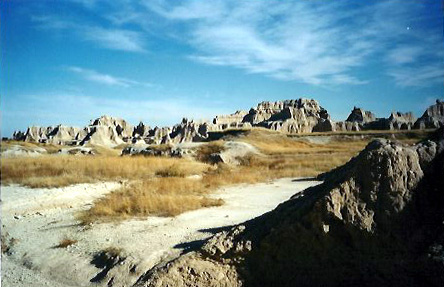
Badlands National Park in South Dakota
(11-01)
All of us owe a huge debt of gratitude to the many men and women who had the
sense and tenacity so we and future generations can enjoy these remarkable
places.
The purpose of the entire national park system is forever engraved in
the stone arch at the Gardner, MT entrance to Yellowstone National Park, which
was the first national park to be established:
"For the benefit and enjoyment of
the people."
There is a paradox, of course (and probably more than this one): the
parks have been set aside for the enjoyment of the people but those same people
sometimes "love the parks to death." If you've been to Yellowstone or Yosemite
or other popular national parks at the height of tourist season, you know what
I'm talking about.
The National Park Service continually struggles with keeping the parks wild
while allowing as many people into them as possible.
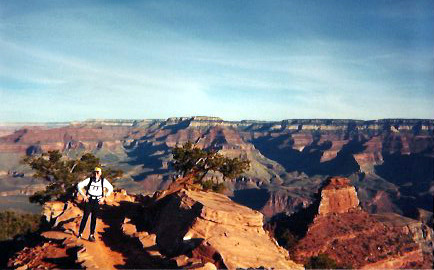
Scanned photos from our Grand Canyon NP
run in March, 2001:
we're having lunch across the river at
Phantom Ranch, below.
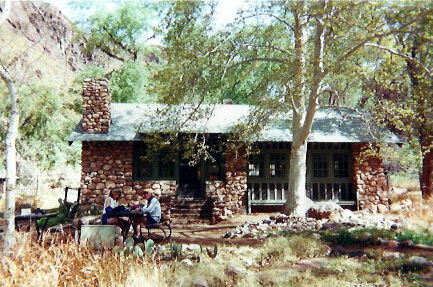
It's a tenuous balancing act between use and preservation.
THE CHALLENGE OF KEEPING THEM OPEN
The park service also struggles with inadequate funding from Congress and
user fees to properly maintain and preserve the parks. That was a problem
even before the current economic recession (or depression, if you lost
your job or house).
[Here's an interesting historical aside from Ken Burns' film: despite
the effects of the Great Depression in the 1930s and the Second World War
during the 1940s, the national parks thrived during those troubled decades. They truly were islands of hope
and a way for people to de-stress.]
[And here's an editorial comment from me about all the roads, trails,
bridges, and
structures that were built in the parks during the Great Depression by the Civilian
Conservation Corps, structures still in use today: instead of the
extremely expensive and ineffective measures being taken now to create jobs and
prop up our economy, maybe we need to emulate some of those public works
programs like the CCC that were so effective seventy years ago . . . at
least we've got something to show for them.]
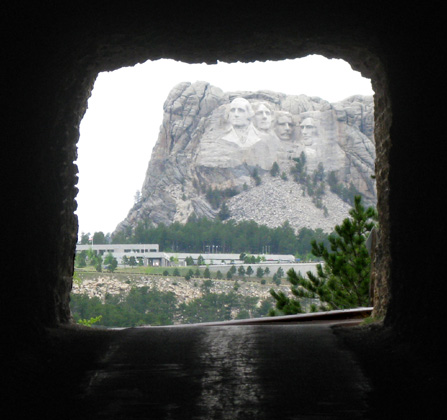
Mt. Rushmore as framed by a nearby
tunnel (5-09)
As soon as we bought our house near Roanoke 5½
years ago we started reading about volunteer efforts to plant visual barriers
(trees, shrubs) and maintain the Blue Ridge Parkway in our area.
Riding gorgeous mountain ridges for 469
miles through North Carolina and Virginia, the Parkway is not only one of the
the country's longest linear parks, it's also free and available to
everyone to use.
Its proximity within ten miles of our house was one reason we moved
there.
We've noticed that it sometimes takes a
while for the NPS staff to clear the roads of ice and snow and felled trees
after storms (next photo). Repaving goes untended longer than adjacent city and county
roads. But the skeletal park staff that remains, along with help from
volunteers, does its best to keep the parkway attractive and serviceable for
both visitors and local commuters.
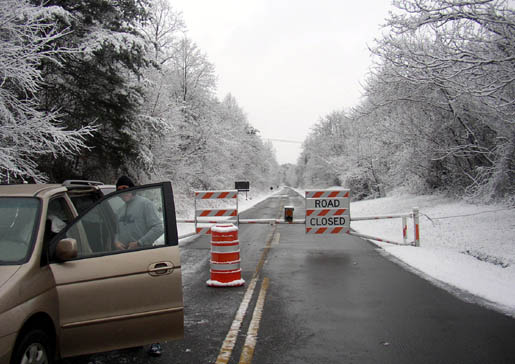
The safest time for us to run on the nearby Blue
Ridge Parkway
is when it's closed due to ice and snow!
(1-05)
I rue the day when it's necessary to close
down or severely limit the operation of any of our national parks, monuments,
or scenic trails.
The difficulty of keeping parks and wilderness areas open for enjoyment by runners, hikers, cyclists, equestrians,
other sports enthusiasts, photographers, birders, leaf-peepers, and everyone
else is a problem at every level of government. There has been a lot of
controversy in several states, most notably California, about closing down
state parks because tax revenues are drying up and cuts in services have to be
made somewhere.
Parks are considered less essential than many other services so they are one
of the first areas of the budget to see serious cuts.
WHAT CAN WE DO ABOUT IT?
As you'd expect from someone who believes in the protection of natural and
historical resources for a variety of reasons, it saddens me to see this
happening all over the country. After all the time and effort that has been
made to protect such spectacular and significant areas -- reportedly 84
million acres of them -- I hate to see public parks and wilderness areas
go into disrepair or be lost forever.
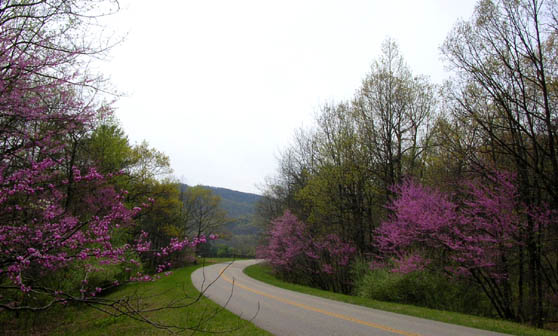
Pretty redbud blossoms brighten up the
Blue Ridge Pkwy. near Roanoke, VA (4-07)
If you believe that these places are important to preserve, for
whatever reasons are important to you personally, I have some suggestions:
- Let your local representatives at all levels of government know how you
feel about park closures and/or serious budget cuts. If there are other
non-essential services that you'd rather see cut instead, let them know (the
money has to come from somewhere, and cuts may be more palatable than higher
taxes).
- Volunteer to help maintain any local, state, or national parks near you
-- pick up trash, clear branches off trails you're using, build or
maintain trails (if park staff will allow that), whatever you have skills and
time to do that can take some of the pressure off rangers and other paid
personnel that are stretched
'way beyond their limits.
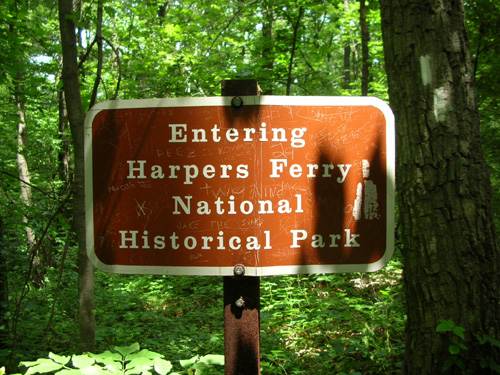
Day 59 from the 20005 Appalachian Trail Adventure Run
- Visit local, state, and national parks regularly and support them with
your entrance fees, annual passes, etc. Annual passes provide free access and
some discounts (camping, transportation, etc.) to sites and lands that charge
a fee and are managed by the National Park Service, US Forest Service, Fish &
Wildlife Service, Bureau of Land Management (BLM), Bureau of Reclamation, and
National Recreation sites. There are general passes for the youngsters under
age 62 and three types of less expensive passes for visitors over 62 (only
$10 for a lifetime!), people who have a permanent disability, and volunteers
who have documented 500+ hours of service on public lands.
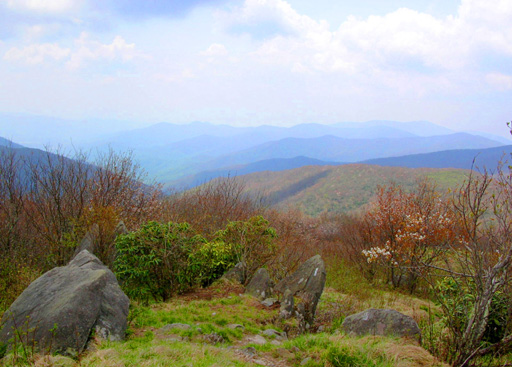
Springtime in the Smokies (Day 14 of our
2005 AT Adventure Run)
- Direct some of your charitable donations to parks, wilderness areas, and
the agencies or organizations that maintain them. If you have a
specific purpose in mind, let them know -- it could be anything from
money for a new sign to the purchase of adjacent land.
- When you make or update your will (you do have a valid will, don't
you??), specify that a certain percentage of your estate will go to the
upkeep of a particular natural place that you love or to support an entity
like the Appalachian Trail Conservancy. That type of donation is a very
appropriate legacy for a runner, hiker, or other nature-lover to leave to
future generations.
THE BIRTH OF A NEW GOAL
Ken Burns' beautiful film about the national park system not only captivated
me during the six nights it was shown, it has inspired me to set a new goal:
to walk, hike, cycle, or maybe even run (just a little bit) in every one of
those 391 parks, scenic trails, historic sites, rivers, and seashores before I die.
If I am
unable to move under my own power before I've seen 'em all, I would like to at
least ride a horse or a motor vehicle over as much of the real estate as
possible.
I don't want to hit three parks in one day. I'm talking
about taking the time to explore each of them to the best of my ability, learn
why each is special, take a bazillion photos, write about them on this website,
and create a treasure trove of memories with Jim. That could mean one morning at a
monument or ten weeks in Alaska.
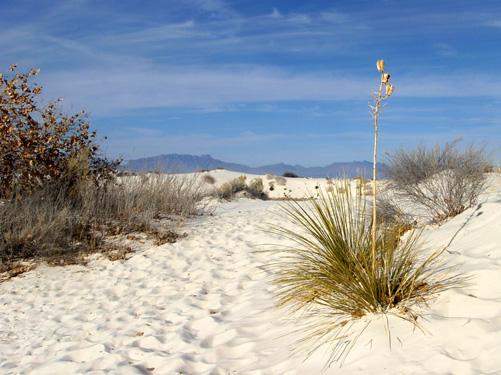
That's sand, not snow, at White Sands
National Monument in New Mexico (January '08)
I got this idea about 30 minutes into the first episode. The proverbial
light bulb went off in my brain when I realized the possibilities . . .
Even before the disheartening news from my orthopedist three days later that
I'm bone-on-bone in both knees, I already knew that my "Thirty-Year Run" was
about to end and I needed to dream up some new adventures to take the place of
the races, journey runs, and other ultra-distance events that I can no longer
participate in except to volunteer or crew for Jim.
This film provided the first real incentive for me to dream some new dreams.
What could be more perfect for someone who needs to be outdoors, appreciates
great scenery and history, and loves to travel??
And I know Jim will enjoy it, too. I can't wait to begin the journey!
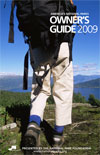
There is a large, free, downloadable pdf. "Owner's Guide" (above) to the national
parks at the National Parks Foundation
website.
The NPF is the charitable partner of the National Park Service, helping
to publicize the park system and raise funds to keep it operating.
The guide is
divided into several regions in the continental USA and territories;
there is a complete alphabetical directory of all 391 sites at the end. The
guide includes enough interesting information and beautiful photos about the
featured parks to get your creative juices flowing: where should we
go next?? Check it out.
DIFFERENT KINDS OF ULTRAS
As I looked through the long list of national park units I counted the ones I've already
visited. That was a surprise; I thought I'd been to more of them than I have -- only about 60
of them in my lifetime, some multiple times.
As you'd guess, the majority of the parks that I've visited are more wild
than civilized -- more remote national parks and scenic trails than historical
monuments in urban areas, for example.
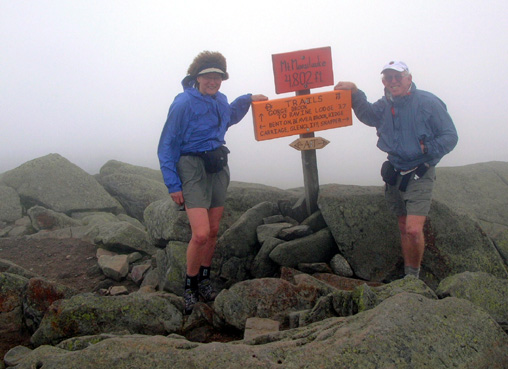
It doesn't get much more wild or remote
than the AT in northern New England!
Here we are on Mt. Moosilauke in New
Hampshire on Day 116 of our 2005 AT Adventure Run.
But I've got a
long way to go! Someday I will make a list of all the units on our website so I can mark off the ones
I have
already visited and record the dates of the new ones as we see them. It will be
hard to just go to new ones, however, because I have favorites like
Yellowstone and the Grand Canyon that I keep re-visiting. Whenever I'm close to
them I want to go back yet another time.
That's OK. This is a lifelong project, not something I want to do in two or
three years. That would be too fast to savor the experience.
There are other wild places like national forests and BLM lands that aren't
even included in this long list of sites. Of course, I'd like to
continue visiting as many of those as possible, too! I'm thinking of our
favorite trails and camping areas in the San Juan National Forest in Colorado,
for example . . .
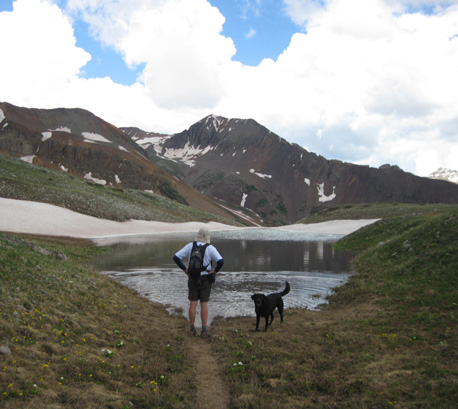
Detour!! Jim and Cody on the
Colorado Trail near Rolling Pass on 7-1-09.
How about seeing as many of the state parks in Texas as we can? We'll be
buying another annual state parks pass soon and haven't seen most of the dozens
of nice parks there yet. (We haven't heard any scuttlebutt about any of them
being closed.) Every state has beautiful parks it oversees.
Speaking of states, I've been in each of the Lower 48 but not Alaska and
Hawaii. I'd love to spend all summer in Alaska one of these years. Jim's been
to Hawaii several times before we met. I don't have any burning desire to travel
there, but I'll have to if I want to see all the national park units. There are
some in US territories, too: American Samoa, Guam, Puerto Rico, the
Virgin Islands, and the Mariana Islands. Looks like we'll have to do some
flying or floating if we want to go to these!
And I think Jim needs to visit all the Civil War sites he can . . .
he's a Civil War buff:
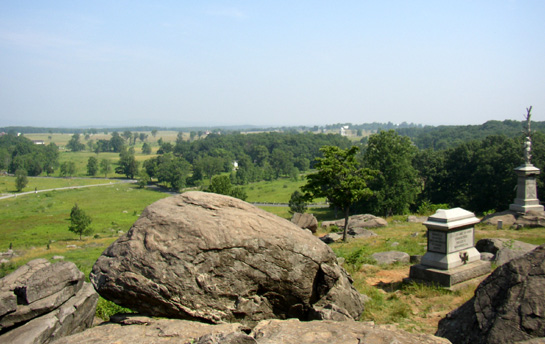
Jim took photos at Gettysburg National
Military Park in Pennsylvania
on Day 63 of our AT Adventure Run. I was
out on the AT and haven't seen it yet.
The possibilities are endless, aren't they?
Everyone has special interests that lend themselves to wandering around the
country like this, whether it's to follow various race circuits (any sport),
run a marathon or ultra in all 50 states and DC (some folks have done that
repeatedly), climb the high points in every state, climb all of Colorado's
fifty-four 14ers, follow migrating birds, tour historic blue highways
like Route 66, and so on.
If you have a passion or a whim, you can design a tour around it that fits
your particular circumstances.
Jim and I both love to plan complicated training and travel schedules so
goals like these are right up our alley. Anticipation is a big part of the fun, too
-- we both love seeing new places and despite all the traveling we've
each done, there is so much of this country we haven't discovered yet.
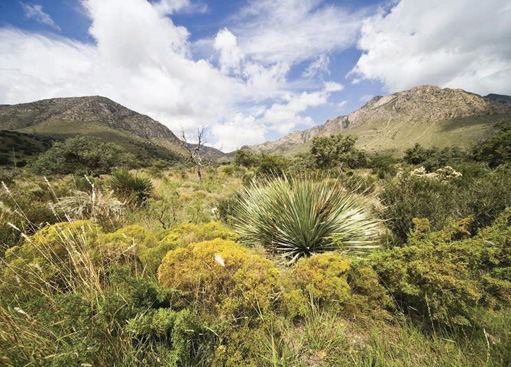
We'll probably visit Guadalupe Mountain NP
in Texas on our winter trip; we've driven by it
several times but haven't gone in yet. (photo copied from the National Parks
Foundation
guide)
Although I love to run and walk in beautiful settings for the sheer joy,
sense of discovery, and fitness benefits, I'm still goal-oriented enough that
something epic like this keeps me more motivated and happy.
There is nothing so satisfying to me as reaching a Big, Hairy Audacious Goal
(one of David Horton's phrases) and sharing the experience with others. If you
have any doubts about that, go to our home page and click on the 2005 AT
Journal.
Exploring the outdoors IS therapeutic. I'm feeling much better just thinking
about all the cool things I can still do outside!
Next entry: our more immediate plans
Happy trails,
Sue
"Runtrails & Company" - Sue Norwood, Jim O'Neil,
and Cody the Ultra Lab
Previous
Next
© 2009 Sue Norwood and Jim O'Neil